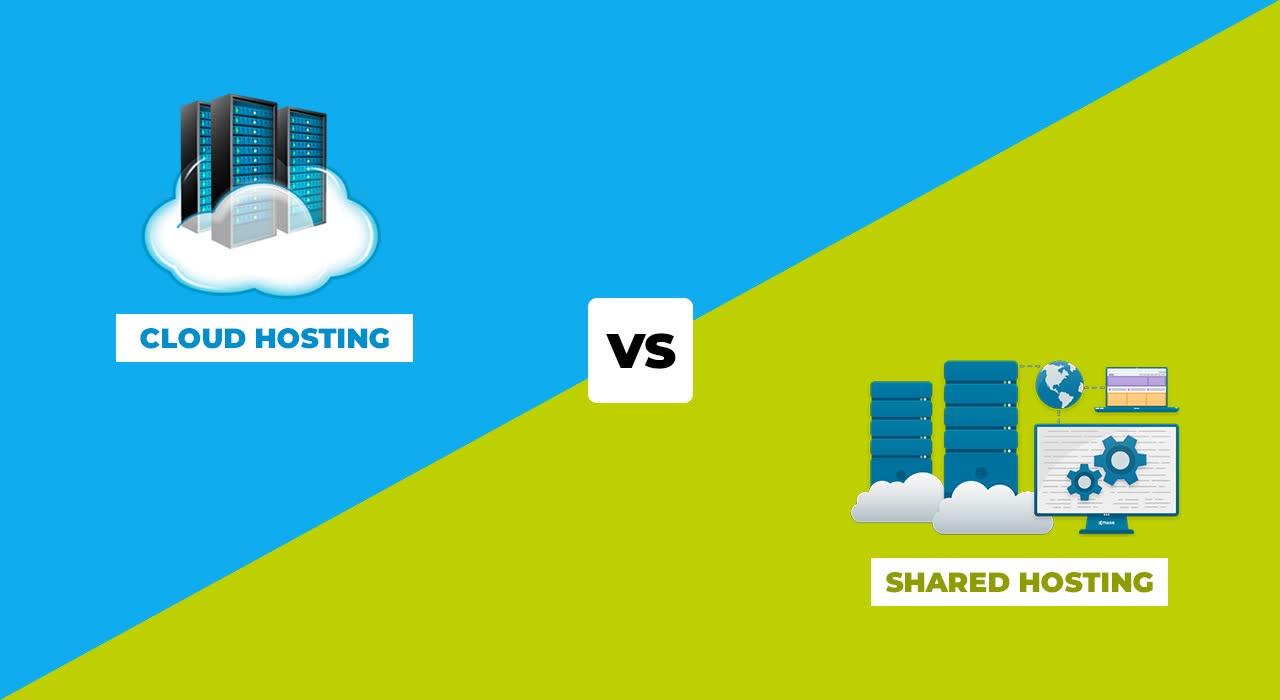Is Cloud Hosting Faster Than Shared Hosting?
Web hosting has evolved as a service that caters to the needs of every business. But there is heavy confusion when it comes to understanding the various types of hosting services. In particular, there are two types of hosting services viz., shared and cloud hosting. Both of them have some typical features that cater to the needs of various industries. It is important to know the difference between the two in order to understand which one is faster.
Shared Hosting

Shared Hosting is a type of web hosting service that makes it possible for many websites to share a single physical web server as well as its resources. In this kind of hosting, servers are divided among various users. Then these users use that particular amount of bandwidth to function. Multiple users use resources such as RAM, disk space, etc.
Deployment of Shared Hosting
Some situations where shared hosting can be deployed are:
- Need for a solid web presence without a large investment
- Less monthly visitor and traffic on the website
- If the business is a startup and in the initial phase of your business
- The needs of the user are limited in terms of resources.
Advantages of Shared Hosting
- Easy to Deploy: This is the most probable reason behind the vast usage of shared hosting. It significantly reduces the time to get online and is easier to deploy.
- Cost-efficient: Shared hosting is inexpensive in comparison to other hosting services and packages. As resources are being shared all over the server, the cost also gets shared eventually.
- Easy to Manage: There are various web hosting management dashboards that help in easy management of shared hosting. This application can be downloaded easily from the internet.
- Freedom from Administrative Responsibilities: The hosting service provider helps in taking all responsibilities that may include maintenance and upkeep of the server. It is not necessary to have a sound technical knowledge to run this hosting service.
Drawbacks of Shared Hosting
Some major drawbacks of shared hosting are:
- Sluggishness: As there are manymembers who are using the same server in shared hosting there are many chances of the slowdown of the network. This happens because more than one member can ask for the same resource and hence the wait time might increase.
- Server Downtime: Due to the same reasons as the last one the server can also face downtime. There are multiple requests by all the members using the same server and hence it might get overwhelmed and stop responding properly.
- Little or No Control over Features: The users don’t have much power to change or suggest any new features in the server. It is all decided by the service providers, and enterprises can only use the resources that are already there. All the users get the same resources and there is no special provision for anyone.
Read Everything You Need to Know About Shared Web Hosting
Cloud Hosting

Cloud hosting, on the other hand, is a type of hosting in which people can obtain resources from cloud-based facilities to host their data, solutions, and other web services. It is beneficial as the users can use multiple servers and are not restricted to a single server for all the processes. This increases security and also the speed. This is also less hectic for the person who takes the service as the facilitator is the one who has to look for its set up, maintenance, and security. All the computing and storage resources are distributed virtually on various machines. This helps the system to manage the load that comes upon it.
Deployment of Cloud Hosting
It is important that an enterprise sets up cloud hosting services when:
- The enterprise is an E-commerce website and is expecting high traffic
- The enterprise wants to spend efficiently on the hosting services by just paying for what they use
- The enterprise doesn’t want to buy any hardware for an on-premise setup
- Enterprise wants to grow in various parts of the world
- Enterprise needs a big storage space with recovery options.
Advantages of Cloud Hosting
- Scalable: As this setup has a great stack and network of resources, it is easy to scale up from small to medium and medium to large. All this can happen very quickly too. As the businesses that take this facility feel like they want to grow the hosting, they can do it. More resources can be added without much problem to the network.
- Quick Page Load Time: The page load time is very fast because this type of hosting server services integrates the caching mechanism. This means that once a paid is loaded, most of its resources are stored in the server so that it can open quickly the next time. Only those details, that were changed earlier, are loaded in the next attempt, all the others are taken from the server only.
- Immense Storage Space: This is one of the biggest advantages of this hosting system. There is immense space available on the cloud and it can be utilized by the businesses. This is an offer that provides enterprises with an edge over others in the market. Due to this reason, there are chances that the deployers can also host more than one website in the same hosting server and control them with a single cPanel. This is all managed without affecting any of the websites on the hosting servers.
- Recovery of Lost Data: This is also an important advantage; the businesses can recover all their data lost on the servers with recovery options provided to them. There are data centers where all the data is stored and kept safe. All the data can be recovered until the users employ a method to destroy the data permanently.
- Saves Expenditure: Users can economize their businesses with this kind of hosting service. The main reason behind it is that the deployer who is responsible for maintaining the infrastructure and enterprises just pays for space and the hosting service. All other things come under the deployer and they are the ones responsible for keeping all that works for them.
Drawbacks of Cloud Hosting
- Dependent on Platforms: It is not possible for users to easily migrate from one another on cloud hosting. This causes vendor lock-in. There are cases when the enterprises can face a lot of trouble if the machine which had all the control of the hosting gets damaged. This is improving with time but still makes a user dependent on a platform.
- Not Flexible and Limited Control: There are some policies and other terms and conditions that might limit the users from using the service properly. There are some, just some cloud hosting companies that impose restrictions and limit control.
Read Cloud Hosting is a Boon for Small & Medium Businesses
Which Is Faster and Better?

After looking at the comparison above, it is not wrong to say that cloud hosting is for sure faster than shared hosting. There are many users on the same server in shared hosting that makes the network comparatively very slow. Thus, it is better for the enterprises, which are looking for a hosting service that has great performance, should go for cloud hosting services. They provide better benefits and the users only have to pay for the resources that they use. It can also be used to grow enterprises in different locations. It might be sometimes more expensive but the benefits, the speed, and growth opportunities make it a better option.






































